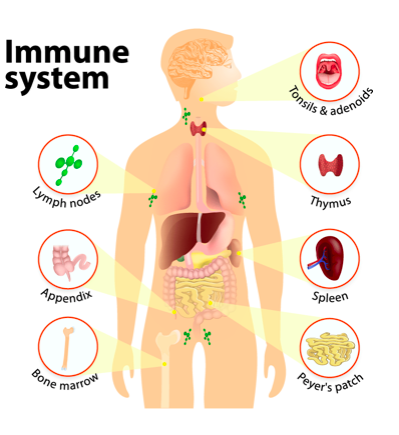|
New threats, powerful defense We’re living in times when our trust that the healthcare system can offer us fast and reliable solutions for any pathology is waning. We’re facing antibiotic-resistant bacteria and an alphabet soup of new viral epidemics--SARS, MERS, H1N1, Zika, Bird and Swine flus, and now COVID-19--with no pre-existing therapies or readiness, prompting us to seek solutions elsewhere. Panic and hoarding are understandable, but not very protective behaviors. Fortunately, drugs and vaccines are not our only defense against microbes. Like all species we, too, have evolved in a world full of microbes and developed our own innate defenses against them. Even when medical and pharmaceutical treatments are available, they are largely dependent on the strength of the body’s innate workings in order to be successful. Instead of emptying store shelves, let’s arm ourselves with a few facts about the power of the immune system so that we can do our best to support it in ourselves and in our loved ones. The immune system - another miracle at work We are continuously exposed to pathogens, ie microbes that have the capacity to cause us harm. They evolved long before plants and animals did, and because of this all species in existence have evolved with defensive strategies against potential infections. This is what we refer to as our immune system. The immune system is spread throughout the body and involves many types of cells, organs, proteins, and tissues all working together to keep us safe from harm. One of its crucial features is that it can distinguish our own tissue from foreign tissue — self from non-self. An antigen is any substance that can spark an immune response. In many cases, an antigen is a bacterium, fungus, virus, toxin, or other foreign body, but it can also be one of our own cells that is faulty or dead. White blood cells of various types play a central role in recognizing, remembering and destroying these foreign invaders. Certain types of white blood cells make antibodies, which mark particles as foreign invaders, while other types of white blood cells kill and engulf the invader, and dispose of it. Most of the time our immune system works so well that we don’t even notice it. We are not aware of the cancer cell it destroyed, the cold virus it killed so that we didn’t get sick, or the balance it’s striking between protecting us from non-self particles while sparing our own cells. But like any system, its delicate balance can be affected by many aspects of our lifestyle.  What impacts the immune system? Immune system function varies over the course of life, with newborn babies depending on antibody protection through nursing, many lifestyle factors common among adults taxing the immune system and many, although not all, people over the age of 65 experiencing some immune dysregulation that makes them less able to respond to immune challenges. This also manifests as a decreased ability to create antibodies and a resulting diminished response to vaccination in older adults. Medications such as cortisone, other immunosuppressant medications, chronic stress, malnutrition, loneliness, overexertion, a sedentary lifestyle, overuse of alcohol and poor sleep and irregular sleep/wakefulness cycles (aka circadian rhythm dysregulation) are some of the more common factors that can tax this powerful system and prevent it from effectively defending us from pathogens. Can you “boost” your immune system? The answer is generally “no”, but more importantly, you wouldn’t want to. An overactive immune system means feeling inflamed, unwell, allergic or experiencing an autoimmune reaction. What you do want, however, is to make sure your immune system functions properly. The effects of nutrition on your immune system Not unlike other bodily functions, the immune system is dependent on certain nutrients. While few individuals in the developed world are dying of hunger, lifespan and quality of life may for many be affected by poor nutrition. It has been estimated that 35% of those aged 50 years or older in Europe, USA and Canada have a demonstrable deficiency of one or more micronutrients . Children may suffer from vitamin and mineral deficiencies due to selective eating habits or lack of sunshine, and the elderly tend to eat less food, but still require the same amounts of micronutrients (and even more protein than younger individuals), which can make for a tricky equation to solve. Micronutrients that are especially important for immune system function include:
Please note, however, that healthy eating habits and supplementation can only support normal immune system function by supplying it with the building blocks it needs to function. You can not build some kind of super immunity by supplying your body with higher than physiologically necessary amounts of these nutrients, or any other interventions either, just like, while sleep deprivation can make you more susceptible to infections, sleeping more than necessary won’t increase your resistance to infections. Inflammaging Inflammation and aging seem to go had in hand, leading to the concept of inflammaging, an imbalance between inflammatory and anti-inflammatory networks contributing to common age-related changes, including immunosenescence, or the aging of the immune system, which, as mentioned, contributes to the increased susceptibility of many older individuals to infectious disease. Anti-inflammatory nutritional interventions can therefore be useful. Fortunately, the aging of the immune system is quite malleable, and affected by both lifestyle choices and medications. In patients with diabetes the immune system is suppressed by the elevated blood sugar levels. Metformin is a drug commonly used to counteract this phenomenon. The herbal compound Berberine has similar effects, leading to speculation that it could help non-diabetics keep blood sugar levels at ideal levels and thus support the immune system. Physical activity exerts an anti-inflammaging effect via several mechanisms. Studies have also shown that individuals who perform regular exercise appear to be at a reduced risk of mortality from infections. Exercise also tends to raise Human High Density Lipoprotein (HDL) levels (levels of what many like to call “good cholesterol”). HDL has both anti-inflammatory and anti-oxidative effects. Other ways of attenuating inflammaging include avoiding caloric excess and eating a nutritious diet. Diets like the Mediterranean diet or other personalized diets with nutritional supplementation with micronutrients and limonene have been shown to both decrease inflammation and improve immune responses. In summary…. Anyone wishing to improve their body’s resistance to infection and illness, whether chronic or acute, can benefit from first and foremost supporting their body’s basic functions by ensuring sufficient levels of nutrients through both diet and supplementation, as well as observing other healthy habits and practices that allow the body to function optimally. Even when a vaccine exists for a particular disease, it is the person’s own immune system that creates the antibodies, and a weak immune system is less able to do so, leading to an antibody response after vaccination of only 17–53% among the elderly. Regular sleep/wake cycles supported primarily by appropriate exposure to light and darkness, supporting sleep, which I’ve written about here, movement, spending time in nature and avoiding loneliness and stress are all powerful tools. Older individuals need to be especially mindful of taking good care of their immune systems, and this includes taking steps to reduce inflammaging. Exercise regularly, move often, give yourself reasons to laugh even more often, eat well and supplement wisely. Did I forget anything? Comment with suggestions here!
12 Comments
mary frankly
7/15/2020 12:39:43 pm
Diabetes breakthrough
Reply
Isabella Lucas
11/11/2022 02:23:53 pm
My ex-husband and I had always managed to stay friendly after our divorce in February 2017. But I always wanted to get back together with him, All it took was a visit to this spell casters website last December, because my dream was to start a new year with my husband, and live happily with him.. This spell caster requested a specific love spell for me and my husband, and I accepted it. And this powerful spell caster began to work his magic. And 48 hours after this spell caster worked for me, my husband called me back for us to be together again, and he was remorseful for all his wrong deeds. My spell is working because guess what: My “husband” is back and we are making preparations on how to go to court and withdraw our divorce papers ASAP. This is nothing short of a miracle. Thank you Dr Emu for your powerful spells. Words are not enough.
Reply
Dexter Tamara
5/30/2022 12:27:22 pm
Reply
Jred Hatty
8/3/2022 03:40:46 pm
I TESTED POSITIVE FOR HSV-2 A FEW MONTHS AGO.
Reply
Juwan James
8/8/2022 10:54:20 pm
HOW I GOT RID OF HERPES VIRUS WITH DR.ISHIAKU HERBS
Reply
Lorenzo baldassarre
10/3/2022 01:52:26 am
Reply
Lorenzo baldassarre
10/3/2022 06:53:15 am
Reply
Jason Bennett
10/31/2022 08:48:17 pm
Omg I Finally Got Helped !! I'm so excited right now, I just have to share my testimony on this Forum.. The feeling of being loved takes away so much burden from our shoulders. I had all this but I made a big mistake when I cheated on my wife with another woman and my wife left me for over 4 months after she found out.. I was lonely, sad and devastated. Luckily I was directed to a very powerful spell caster Dr Emu who helped me cast a spell of reconciliation on our Relationship and he brought back my wife and now she loves me far more than ever.. I'm so happy with life now. Thank you so much Dr Emu, kindly Contact Dr Emu Today and get any kind of help you want.. Via Email [email protected] or Call/WhatsApp cell number +2347012841542
Reply
Juwan James
11/14/2022 08:34:01 pm
Hello everyone. Dr Ishiaku herbs is a good remedy for herpes Virus , I was a carrier of herpes virus and I saw a testimony on how Dr. Ishiaku cure Herpes Virus, I decided to contact him, and he guided me. I asked him for solutions and he started t..he remedies for my health. After he finish he sent me the herbs which i took for 2 weeks before asking me to go for a check up and getting there i could not believe that i was confirm HSV 2 Negative after the test, Today i am so happy because I'm free from herpes disease with the help of Dr. Ishiaku . Thank God now everything is fine, I'm cured by Dr. Ishiaku herbal medicine, I'm very thankful to God for making it possible. you can reach him on his email, i strongly recommend him to any one out here looking for a cure to herpes or any other deadly disease...Contact Dr ishiaku via email: [email protected] or whats-app +2348180828544...
Reply
MICHAEL CALCE WIZARD
11/15/2022 09:12:18 am
MICHAEL CALCE WIZARD SOFTWARE HACKING GROUP ★ ★
Reply
briana haleck
12/2/2022 01:35:24 pm
I'm so happy to testify of the good work of Dr Maggi , I have been Suffering from Herpes virus since 2018 and i had frequent symptoms in my private area, after some time it will go away after using acyclovir drugs, then come back after some months. it was disheartening since i have been diagnosed, but after finding Dr Maggi and his reviews i was convinced that he will definitely cure me and so i contacted him and he told me how to get his medicine and using it for just 14 days and i will go for check up and first i said how can that be possible but i used his herbal medicine after making purchase and truly i used it and went for the test again, and my result came back negative. so i made it a task to share this good testimony in the internet so that those sick can benefit and get cured. WhatsApp or call: +19179796387 Or Email: [email protected]
Reply
Your comment will be posted after it is approved.
Leave a Reply. |
Archives
February 2024
|

 RSS Feed
RSS Feed